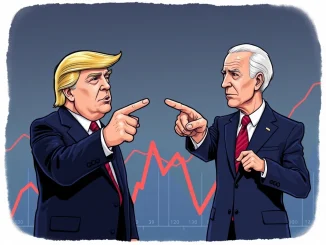
Global markets, including the often-volatile cryptocurrency space, frequently react to major geopolitical and economic shifts. A significant development recently emerged concerning US China trade talks, which could signal a move towards greater stability in the complex relationship between the world’s two largest economies.
What Was Agreed in the Geneva Discussions?
Following recent talks in Geneva, the United States and China have reached an agreement to establish a structured mechanism for continuous consultations on their economic and trade relations. This move, reported by Chinese news outlet Jin10 citing a joint statement, aims to create a more predictable environment for addressing trade issues.
Key aspects of the agreement include:
- Establishing a formal framework for dialogue.
- Consultations can be held in the U.S., China, or a mutually agreed third country.
- Provision for working-level talks as needed to tackle specific issues.
This step suggests a mutual recognition of the need for structured communication to manage disagreements and explore areas of potential cooperation within their extensive US China economic relations.
Why is a Trade Framework Important?
The decision to establish a formal trade framework is crucial because it provides a dedicated channel for communication beyond ad-hoc meetings. In the past, trade disputes between the two nations have led to tariffs, market uncertainty, and volatility that impacted global supply chains and financial markets. A structured approach can help:
- Reduce miscommunication and escalation risks.
- Facilitate the resolution of specific trade barriers or disagreements.
- Create a more stable environment for businesses operating internationally.
For market watchers, including those in the crypto sector, any sign of de-escalation or structured engagement between the U.S. and China is noteworthy, as it can influence overall market sentiment.
What Does This Mean for Ongoing Talks?
The agreement paves the way for regular and predictable ongoing talks. Instead of reactive discussions driven by crises, the framework allows for proactive engagement on a range of economic issues. This could include topics like trade imbalances, technology competition, investment policies, and intellectual property rights.
While the establishment of a framework doesn’t automatically solve existing problems, it signifies a commitment to dialogue as the preferred method for navigating differences. The inclusion of options for location and working-level discussions provides flexibility for addressing both high-level strategic issues and detailed technical matters.
How Might This Impact Global Markets (Including Crypto)?
While the direct impact on cryptocurrency is not immediate, macro-economic stability and reduced geopolitical tension generally foster a more favorable environment for risk assets. The crypto market is sensitive to global liquidity, investor confidence, and the overall economic outlook. Positive developments in US China economic relations, facilitated by the agreed-upon trade framework, could:
- Improve overall market sentiment.
- Reduce volatility stemming from trade uncertainty.
- Potentially encourage broader investment in various asset classes as global economic prospects stabilize.
Conversely, if these ongoing talks fail to yield concrete results or break down, it could reintroduce uncertainty and negatively impact market confidence. The outcomes of future Geneva discussions or talks held elsewhere under this framework will be closely watched.
Conclusion: A Step Towards Stability?
The agreement between the U.S. and China to create a formal mechanism for ongoing trade talks is a significant step. It establishes a crucial trade framework for managing their complex economic relationship, moving towards more structured and potentially less volatile interactions. While the path forward will undoubtedly still involve challenges, this commitment to dialogue offers a glimmer of hope for increased stability in US China economic relations. For cryptocurrency investors, monitoring the progress of these discussions is essential, as global economic dynamics remain a key influencer on the digital asset landscape.



